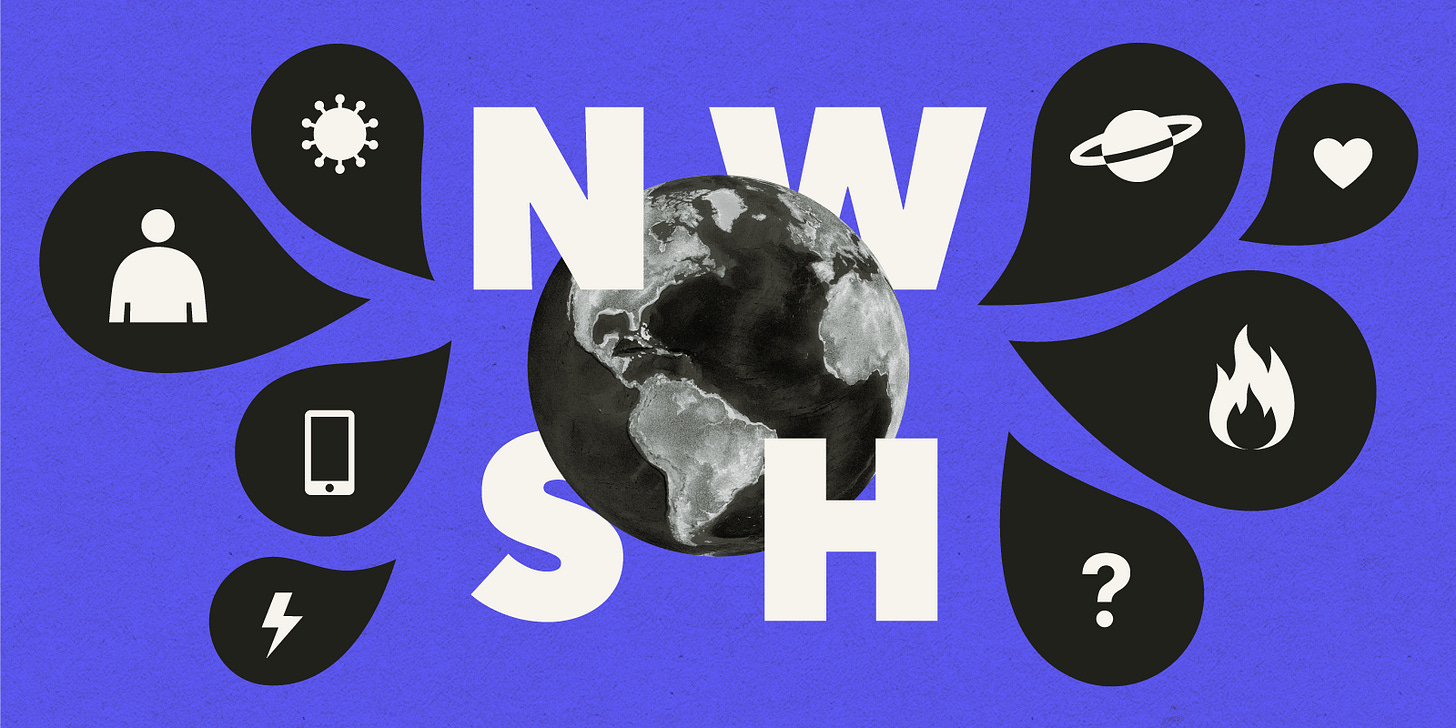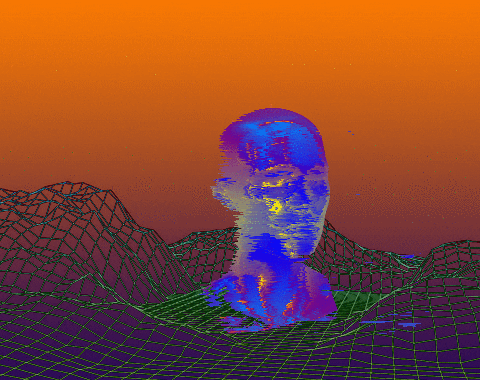Welcome to the mid-week update from New World Same Humans, a newsletter on trends, technology, and society by David Mattin.
If you’re reading this and haven’t yet subscribed, join 22,000+ curious souls on a journey to build a better future 🚀🔮
To Begin
This week, a firestorm broke out among artists when work created by an AI image generator won a mainstream art prize.
Also, scientists say Greenland ice melt will cause global sea levels to rise much more than previously believed. And we check back on the crypto-mad president of El Salvador and his plans to build a Bitcoin City.
Let’s go!
🖼 Machine dreams
This week, further dispatches from the ongoing collision between AI and human creativity.
US citizen Jason Allen took first prize in the Colorado State Fair’s fine art competition. The catch? His winning submission was created by the AI image generation tool Midjourney. The work, called Théâtre D'opéra Spatial, won in the digital art category; Allen printed it on canvas before submitting it to the competition.
Allen says he credited his work as by ‘Jason Allen via Midjourney’. Still, the win caused a storm on Twitter, with many — including some artists — in this viral thread arguing that Allen had stolen his victory from a ‘proper’ artist.
Allen, meanwhile, says AI art is a legitimate medium. The skill, he argues, lies in the invention of prompts that generate compelling images.
Explaining the genesis of Théâtre D'opéra Spatial in the Midjourney Discord channel, Allen said: ‘I have been exploring a special prompt that I will be publishing at a later date. I have created hundreds of images using it, and after many weeks of fine tuning and curating my generations, I chose my top three and had them printed on canvas.’
⚡ NWSH Take: The emergence and cultural impact of AI image generation tools is playing out at a speed that’s hard to fathom. Many will struggle with the idea that machine-generated images can be art. But it’s undeniable that interesting work is going on; look, for example, at the work being created by AI artist Rivers Have Wings, or this AI-generated, audience-guided film. Sure, these artists are not composing these works themselves. Then again, Damien Hirst didn’t put his shark in its tank himself, but we still regard him as an artist. // As Allen argued, much of the human creativity here lies in the iterative development of text prompts that give rise to interesting images. Now, we’re even seeing the emergence of prompt marketplaces, where AI artists sell effective prompts. How to understand all this? Back in New Week #92 I wrote briefly on massive language models as a radical new kind of search engine. The same idea applies here; we can think of Midjourney et al as tools that search our visual heritage and return to us new images that align with their findings. The skill, then, will lie in sending these AIs down fruitful paths. // All this is so new; we’re still at the outset of any attempt to understand the interface between human creativity and AI. But the broader question that this journey raises — how should we relate to this new form of intelligence emerging around us? — is one that we’ll only face more acutely as the decade wears on.
🌊 Oceans apart
A study published this week suggests global sea levels may be about to rise by more faster than previously believed.
Published in the journal Nature Climate Change, the paper argues that 3.3% of Greenland’s total ice volume is set to melt by the end of the century, causing a global sea level rise of 10.6 inches (27cm). What’s more, this melting and associated sea level rise is now inevitable; it will still occur even if we halt the emission of all greenhouse gasses today.
Researchers studied satellite images of Greenland from between 2000 and 2019 to forecast future melt. The sea level rise predicted in the paper is over twice that previously predicted as a result of Greenland ice melt.
Dr William Colgan, from the National Geological Survey of Denmark and Greenland said:
The minimum of 27cm is the sea-level rise deficit that we have accrued to date and it’s going to get paid out, no matter what we do going forward. Whether it’s coming in 100 years or 150 years, it’s coming. And the sea-level rise we are committed to is growing at present, because of the climate trajectory we’re on.
Even a one foot rise in global sea levels will have serious consequences for coastal settlements around the world, including on both US coasts. The UN says some 90% of global megacities are vulnerable to rising sea levels.
⚡ NWSH Take: Remember, according to this paper 27 centimetres is the minimum coming sea level rise we’ll see across this century. The authors of this new paper say the actual rise could be double that, or more. The consequences will be severe for coastal communities and low-lying countries. // All this taps into two emerging NWSH obsessions. First, floods as a megaforce that will do much to shape the 21st-century. That means both their destructive power, and our attempts to avoid or ameliorate it. Second, the rise of floating cities in response to that reality; back in New Week #80 I wrote about the UN’s plans to build multiple such cities around the world in partnership with superstar Danish architect Bjarke Ingels. // Floods, drought, heatwaves and wildfire — in 2022 we’ve seen historic examples of each; see the human catastrophe unspooling in Pakistan right now, or the record drought in China. They’re the manifestations of a derangement of the natural world that is starting to feel much more real than it did even five years ago. Be prepared; things are only going to get stranger and more difficult.
🤑 Back to Earth
This week, one glimpse of the human price being extracted by the current crypto-winter.
Back in November I wrote about the president of El Salvador, Nayib Bukele, and his plans to build a new Bitcoin City at the base of the Conchagua volcano. The city, said Bukele, would be tax free for residents; it would fund itself by drawing on thermal energy to fuel the mining of new bitcoin.
What could possibly go wrong?
Since November, the price of bitcoin has tanked, falling from a high of $67,000 in that month to around $20,000 today. Bukele reportedly spent $100 million on bitcoin that are now worth $48 million. Meanwhile, his decision to force citizens to accept bitcoin as legal tender now looks rash.
And this week his government announced that the forthcoming ‘bitcoin bond’ — intended to help raise money to fund the creation of Bitcoin City — has been delayed due to ‘security concerns’. If ever launched, it will be the world’s first government bond backed by bitcoin.
⚡ NWSH Take: Bitcoin and the crypto boom turned out to be unstable foundations on which to build a national economic strategy. Who would have thought it? Jokes aside, Bukele’s cryptomania has done serious damage; El Salvador’s debt has been downrated to junk status by every major credit ratings agency, making it harder for the country to borrow money. The government is reportedly running out of cash. // The collapse of Bukele’s Bitcoin City plans is a reminder of the current crypto winter. But I’m here to issue an associated, contrary reminder. That is, don’t allow your awareness of that winter — or your memories of the kind of mania that Bukele symbolises — to stray into a belief that what happened last year was all hype and nothing more. Yes, the frenzy around NFTs and the insane rise and fall of obscure cryptocurrencies had all the characteristics of a bubble. But the underlying technologies are powerful, because they unlock new ways to serve fundamental human needs: value, community, status, and more. Bitcoin City may never rise at the base of the Conchagua volcano. But crypto and other web3 technologies will be back.
🗓️ Also this week
🍽 Stanford engineers built the world’s first totally autonomous restaurant in San Francisco. Mezli serves Mediterranean-themed dishes conceived by a Michelin-star chef. Customers punch in their order at a touchscreen — Mezli say over 60,000 menu variations are possible — and the chosen ingredients are mixed, heated, and served in a bowl that customers collect from a hatch. See the end-to-end process in this video.
🌊 A fifth effort to pass a global agreement on protection of Earth’s oceans has failed. Talks on the UN High Seas Treaty, which aims to protect sea life and regulate exploitation of ocean minerals, have been going on in NYC for the last two weeks. But negotiators say they’ve been unable to agree terms.
📣 A startup has developed AI technology that can ‘erase the accents’ of people who are not native English speakers. Sanas was founded by three Stanford graduates, and offers ‘accent translation’ aimed at call centre workers in India, the Philippines, and elsewhere. But critics say the technology helps embed racial and cultural bias, and aims to make workers ‘sound white’.
💨 The world’s biggest offshore wind farm is now operational in UK waters. Hornsea 2, which lies 55 miles off the British coast, can generate enough electricity to power 1.3 million homes.
🚢 Cruise giant Royal Caribbean says it will partner with satellite internet provider Starlink to offer broadband internet on all of its cruises. The company says a test of the service ‘received tremendous positive feedback’. I have been known to comment on the damage that Starlink satellites are doing to our view of the night sky.
🏊♂️ The French government says it is using AI to locate undeclared swimming pools in the gardens of residential properties. In France, ownership of a swimming pool is relevant in the calculation of property taxes. The system, in use since October, has already located over 20,000 undeclared pools.
💾 The Japanese government says it will finally change laws that require businesses to save data on floppy disks. Around 1,900 government procedures currently demand that businesses use the disks; Japan’s digital minister says he is ‘declaring war’ on the outdated devices, asking ‘where does one even buy a floppy disk these days?’
🚀 NASA says it will attempt another Artemis 1 moon rocket launch on Saturday. The rocket will carry an uncrewed capsule on a 37 day mission to orbit the moon and come back to Earth. The Artemis programme seeks to establish a permanent base on the moon by the end of the decade.
🌍 Humans of Earth
Key metrics to help you keep track of Project Human.
🙋 Global population: 7,971,681,842
🌊 Earths currently needed: 1.7879667109
💉 Global population vaccinated: 62.2%
🗓️ 2022 progress bar: 67% complete
📖 On this day: On 2 September 1666 the Great Fire of London starts in a bakery on Pudding Lane. The fire burns for three days, destroying much of the city.
Ways of Seeing
Thanks for reading this week.
The rise of AI image generators is seeing human creativity collide with computing power in new and compelling ways; it’s yet another case of new world, same humans.
This newsletter will keep watching. And there’s one thing you can do to help: share!
Now you’ve reached the end of this week’s instalment, why not forward the email to someone who’d also enjoy it? Or share it across one of your social networks, with a note on why you found it valuable. Remember: the larger and more diverse the NWSH community becomes, the better for all of us.
I’ll be back next week. Until then, be well,
David.
P.S Huge thanks to Nikki Ritmeijer for the illustration at the top of this email. And to Monique van Dusseldorp for additional research and analysis.















